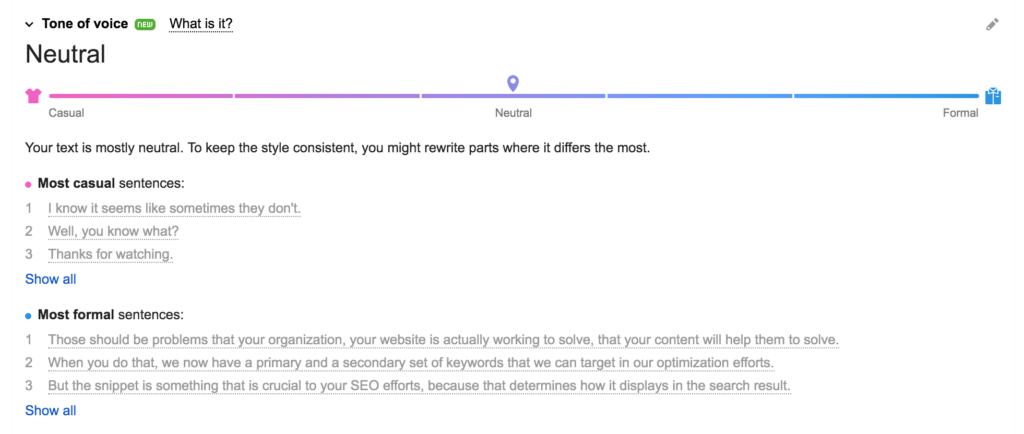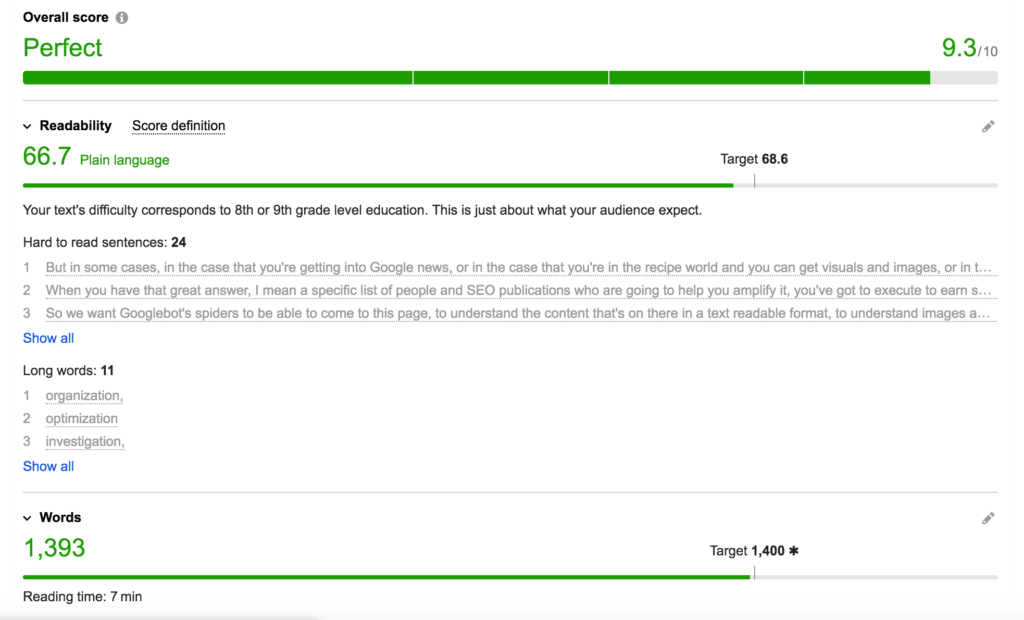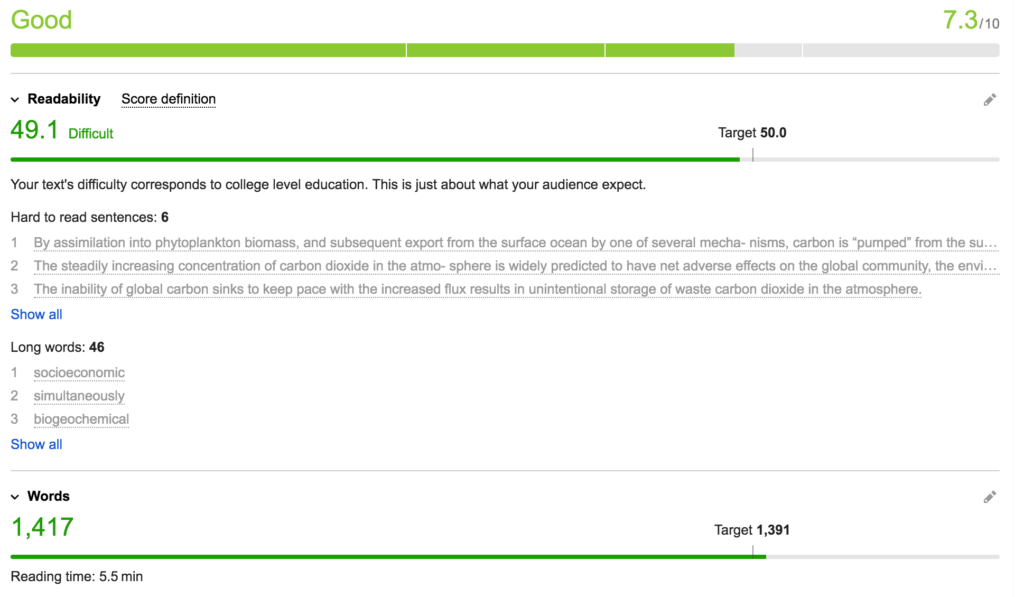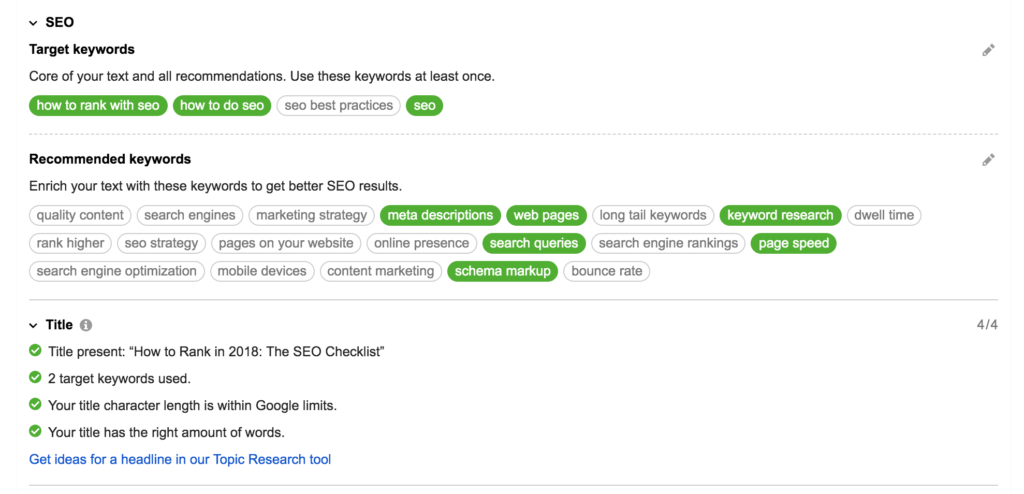As technologists we’re constantly exploring new tech to make our lives easier, but occasionally we stumble on new stuff that actually makes us look good. The brand new SEMrush Writing Assistant promises to address both of these benefits. But as we know from many product launches, the hype machine is highly capable of outselling the reality.
This is the first in a series of product reviews that we plan to share to help our clients understand us, and what we do, a little better. We’re hoping you can find them useful. If there’s anything you feel we could add or other products you think might fall into our spectrum, we’d love to hear from you!
What Does SEMRush’s Writing Assistant Do?
For most tools, performance depends on purpose. A hammer is great when dealing with nails, but terrible for heart surgery. Tools work best when they match their intended goal, so with that in mind, what does this tool want to achieve?
SEMRush Writing Assistant has two goals.
- It aims to offer content optimisation, to create better written, better performing articles.
- It aims to give SEO advice for articles and blog posts, and help them rank higher on Google, and other search engines.
In this post, we’re going to be reviewing how well SEMRush achieves each of those goals. And we’ll be looking at whether it’s worth the hefty price tag.
Let’s get started!
Content Optimisation
SEMRush’s first offering is content optimisation. Content optimisation includes a few different tasks.
SEMRush Grammar Checker.
The first role it serves is to check grammar and sentence flow. And it serves this role well! The SemRush grammar checker reliably identifies common grammatical errors, and highlights lengthy, overcomplex sentences. It will tell you if you need to split a sentence, or edit it. It even identifies overly complex, jargonistic words that might make things difficult for your audience.
This is a highly useful tool. However, the grammar checker is also easily replaceable. Many other tools serve this purpose just as well, and some alternatives do so for free.
For example, Grammarly are hugely effective at identifying grammatical errors and improving sentence flow. And while they have premium options, their general extension is totally free.
On the other hand, if this is the most important feature for you, other tools even go beyond what SemRush offers. Hemingway Editor costs only $19.99, and offers similar advice to the SEMRush editor for a much lower price tag. It also offers a few extras beyond SemRush, including the ability to remove ‘weakening phrases’ so you can write more forcefully.
Take Home Insight: The SemRush grammar checker works very well. But free tools such as Grammarly are just as effective. This use is great, but isn’t enough on it’s own.
Tone of Voice Meter
Of course, the SEMRUSH writing assistant offers a number of other tools too, including a tone meter.

This works to identify the general tone of your language; whether it is formal, casual, or in between. The aim of this isn’t to avoid all formal or casual language. The aim is to identify where you fit, and find any sentences that don’t match the rest of your piece.
That way, you can change those sentences so they better fit the whole. And by doing so, you can make your whole post more consistent.
Our Judgement: this is a great tool! It works effectively, and there isn’t a close competitor on the market. However, on it’s own, this isn’t really worth the price tag. On the other hand, if you’re already using SEMRush pro it’s a useful perk!
Readability Optimiser
In terms of content optimisation, the final draw of SemRush writing assistant is the readability optimiser. Readability is the ease with which a reader can understand written text.
Obviously readability is important. But how well does this really work?
Code4 ran some tests to see how well it achieves each of these goals. If the content optimiser is well calibrated, then it should reliably be able to rate great writing well, and poor writing badly.
To test whether the SEMRush SEO Optimiser was well calibrated, we decided to run it on a variety of text styles.
We tested the readability of 1000 words from a few different sources. We tested an SEO optimised web page, an academic paper, and even tested Shakespeare’s ‘Hamlet’!
If this tool works well, we’d expect low reading difficulty from from an SEO optimised web page, and higher difficulty for the other two.
But the real results were much stranger… Here’s what we found.
RESULTS
SEO OPTIMISED TEXT/HOW DOES IT RATE SEO OPTIMISED SITES
If this is a truly valuable tool, it should be able to correctly rate SEO optimised pages. With that in mind, we plugged in what we expected to be perfectly search optimized content from Moz, a site explicitly known for it’s expertise at SEO.

The writing assistant performed with flying colours here. It rated their text at a low to medium difficulty, which is what their audience would expect.
SEMRush also rated this site particularly highly due to a number of other tweaks they’ve made to optimise their content. For example, they have used image alt attributes, and a number of internal page links. SEMRush views this highly, as it provides good SEO value.
Though we have some criticism of their readability score (which we’ll explore next), this SEO analysis is truly phenomenal. But more on that later.
ACADEMIC TEXT/COMPLEX TEXT
Our second test was against a technical academic paper, directed at a totally different audeince. Interestingly, the writing assistant was surprisingly accurate with technical papers as well.

The SEMRush writing assistant performed well here too.
Interestingly, it will adjust it’s readability score depending on the content of what you write. If it detects that you are writing to a more difficult audience, it will adjust your readability score, encouraging you to use more complex language.
As above, while the tool’s base target readability is 65, when we input an academic paper it adjusted the target input to 50. This means that it identified our audience, recognised that they were used to more complex content, and altered the target to match.
Here’s the best thing. To identify this target readability, it samples text from your top 10 competitors on Google, for the key phrases you are optimising for. It then takes the average readability score of those 10 competitors, and uses that as your target readability.
This is an incredibly useful tool. Not only does it help you to keep a consistent tone, but it gives you in depth competitor analysis, and let’s you understand the level of difficulty your audience is used to. This knowledge of competitor behaviour can give you a huge advantage when trying to get your audience’s attention.
The readability analysis worked well in our first two cases. However, our third test, on text from Shakespeare, identified some serious flaws with SemRush’s writing assistant.
SHAKESPEARE
Here is where it gets interesting.
After examining the text, the SEMRush Writing Assistant gave some very strange results. According to their algorithm, the language of Shakespeare is ‘considered too basic’, claiming the text is only written at a 5th grade level.

This might come as a surprise to anyone who struggled with Shakespeare’s medieval prose. In short, the rating is an error, caused because of SEMRush’s simplistic content rating algorithm.
This algorithm looks at total words per sentence, and total syllables per word, but ignores all other factors. Rarity and difficulty of words are not considered. Grammar, sentence structure, and paragraph structure are not rated either. With that in mind, whether the explanation is technically written, beautifully crafted, grammatically elegant, or interesting and enjoyable, it won’t matter. Similarly, if your text is badly written, or grammatically terrible, this won’t be picked up. All that matters in SEMRush’s readability rating is whether the words and sentences you use are short.
There is a reason for these errors. SemRush uses an algorithm called the ‘Flesch reading ease formula’. This offers a grade level readability score, based on the average length of words and sentences.
They assume that longer words are harder words, and longer sentences are harder sentences.
This is a decent assumption, but far from perfect. And it leaves much information out. For example, it doesn’t account for whether text is entertaining
They can’t tell whether the sentences are clear, or entertaining, or cohesive. And they can’t tell if words are familiar to your audience.
The Flesch reading score has been heavily criticised for a number of reasons.
The formulas don’t measure ease of reading
Readability formulas ignore most factors that contribute to ease of reading. It won’t tell you whether you are holding your audience’s attention. It won’t tell you if your content is structured well. And it won’t tell you if people understand what you’re saying. That is all out of the scope of the formula. Because of that, Grade Level Scores aren’t a good way to judge the suitability of your report.
False Precision
This rating gives an exact score to rank your piece. However, they sound much more accurate than they are. Experts agree that these ratings should be considered more generally. e.g. 4-6th grade means it is easy to read. 7-9th grade? That’s average difficulty. And 10th or above is rated as difficult. These estimates shouldn’t be used exactly.
However, they can be very good at alerting you when your text is too difficult. If used loosely, this can act as a useful indicator. Just don’t trust it blindly.
Take Home Lessons
This readability analysis is very simplistic. Although the tool has some use, it aims far beyond it’s reach.
The readability score acts as a regular reminder to keep your text consistent.
But will it ensure that the reading level of your post 100% matches your audience? No. And will the tool guarantee that your content is good? Nowhere close. This tool won’t accurately judge writing quality. And it won’t make bad writing good. If you want a comprehensive guide to whether your post is well written, or suits your audience, this tool doesn’t make the mark.
However, while it fails on readability. On SEO, SEMRush is truly phenomenal.
What about SEO Optimisation?
So far, we’ve been very hard on the SEMRush Writing Assistant’s content advice. Particularly their readability score. But it’s not all bad news. There are other areas where they stand out.
Their SEO advice, their market research, and their competitor research is truly incredible.
In short, they provide one of the best SEO tools on the market.
And here’s why.
KEY FEATURES
There are three key features which set SEMRush’s tool apart from their competition.
Recommended Keywords
SEMRush provides outstanding keyword research. It is better at this than almost any platform on the market. And with the writing assistant, the research is done for you.
the SEM writing assistant is able to suggest keywords to work into your text to improve your reach and improve your SEO. These words are drawn directly from your content, based on their popularity and ranking difficulty.
SEMRush lets you view a word’s monthly search volume, and will also tell you that word’s difficulty score. The lower the difficulty, the lower the competition, and the easier it will be to rank. This saves you time, and let’s you find the ideal words to target.
No matter how you write your site content, this is incredibly useful. If you have new content, but don’t have target keywords to rank for, this offers an easy, low effort way to source the ideal keywords.
Alternatively, if you have some ideas of keywords to rank for, the SEMRush writing assistant offers instant research on similar words. It can give you information on both the popularity and difficulty of those words. This means you can be sure that you are ranking for words that matter, instead of optimising for words that only get five searches per month.
Of course, SEMRush doesn’t profile the entire internet, so the estimates they give aren’t exact. However, they serve their function perfectly. The estimates aren’t perfect, but they give a clear idea of which words are high in traffic, and which are low. And when optimising your content, that ability offers you a massive edge.
SEO Checklist
While the SEMRush Writing Assistant isn’t nearly as complex as many think, in other aspects it is still incredibly useful. This tool isn’t going to write your posts for you, or correctly rate your readability. But it can work as an alarm, and alert you if you have obvious SEO issues. If there’s a problem with your post, you’ll have a much better chance of detecting it.


What this tool is outstanding at is working as a check list for best practice SEO optimisation tips for your post. It offers a useful checklist of things to tick off within each post.
The writing assistant will help remind you of the basics. Among other tips, this includes
- Make sure you use key phrases in your introduction
- Have the correct meta-description length
- Make sure your images have the correct alt attributes
- Use your key phrases in the title
This is a really good checklist.
If every post you write is optimised using this check-list, it’ll stand in good shape, at least in SEO terms.
This is a great benefit that SEMRush writing assistant provides. If you have an SEO expert, they’ll know what to do to optimise your posts already. But if you’re not an SEO expert, this will make sure you never make a basic mistake again.
The side benefit of this is that it streamlines content production, and makes it easier for content producers to SEO optimise their pieces.
For us, that provides outstanding value.
Overall Page Rating
The SEMRUsh assistant also offers a general page SEO rating, which acts as a constant reminder of all of the things we’ve listed. This takes into account your keyword use, SEO checklist, readability, grammar, paragraph structure, and more. This this is a quick and easy way to check if you’ve used all of the basic SEO techniques needed to optimise your post.
What about Price?
The SEMRush editor isn’t cheap. It requires SEMRush Pro, which is $99 per month. SEMRush Pro also allows you to do elaborate keyword research, and is one of the best SEO tools on the market.
On it’s own, the editor may not be worth this cost, but with SEMRush Pro’s analysis, this stands to offer a huge amount of value. And the good news is, if you already have Semrush Pro then the SEO editor comes with no extra cost.
If you’re on a budget, don’t panic. SEMRush may be beyond you. But there are alternatives.
A cheaper alternative which offers many of the same benefits is Yoast SEO. For $89/year it offers similar keyword research abilities, showing recommended keywords, key phrases, internal linking suggestions, and identifying overly complex sentences. Combine this with a free subscription to Grammarly, and many of the high impact benefits of SEMRush’s assistant are covered.
However, for the traffic estimates, the SEO checklist, SEO rating, and keyword suggestions, SEMRush can’t be matched. If you’re a decent sized agency which will use SEMRush’s suite regularly, the SEMRush builder is well worth the price.
Final Verdict
SEMRush’s Writing Assistant won’t do everything for your SEO. It isn’t a silver bullet. But it’s very useful to detect if any key SEO features are missing. And it’s great for streamlining the SEO process. For us, that’s a useful service.
While the readability calculator has issues, and the grammar correction is easily replaceable, but the SEO side is vital. The keyword suggester allows us to focus our content, and the built in SEO checklist that it offers makes it even simpler to optimise our posts. As long as you recognise the tool’s limits, and know when to listen and when to ignore, the SEMRush Writing Assistant is well worth trying out.
If you already have SemRush, this is the best tool on the market. On the other hand, if you’re a smaller organisation on a budget, then Yoast SEO might fit you better. It isn’t identical, but it can do most of the important tasks, for a fraction of the cost. Have you tried any of these tools and got different results or thoughts? Let us know in the comments.